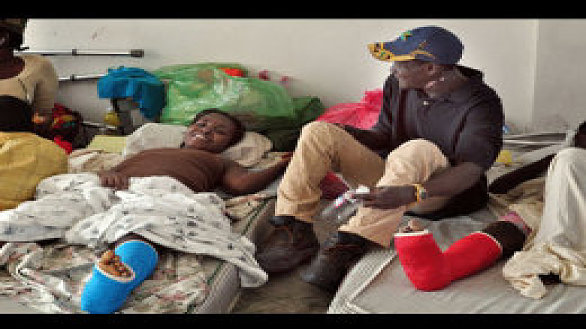A young surgery patient of Dr. Michael Kent flashes a smile following her leg surgery. Dr. Kent performed more than 50 surgeries in five days in the Dominican Republic following the Port-au-Prince earthquake. Photo courtesy of Dr. Michael Kent
By Eleanor L. Colvin
SUGAR LAND, Texas (UMNS) United Methodist surgeon Dr. Michael Kent, 35, returned to his Sugar Land home in late January from an “adventure of a lifetime,” in which he provided emergency medical relief to the people of Haiti following the Jan. 12 earthquake.
“I got a phone call last Thursday (Jan. 14), from a friend who is an orthopedic surgeon. He asked me to go on an adventure with him,” said Kent. “Turns out, the adventure was going to Haiti.”
The pair didn’t know much about where they would serve, or even how they would get from the airport to the border town of Jimini in the Dominican Republic. “We just knew that there were a bunch of injuries that needed an orthopedic surgeon,” Kent said. “Very rarely am I useful in a disaster. But an earthquake is one where that sort of injury calls for orthopedic specialists.”
With five years of medical practice under his belt, and a solid spiritual foundation – formed at Lake Jackson United Methodist Church as a youth and now strengthened at Christ United Methodist Church Sugar Land near Houston – Kent took a leap of faith
“Obviously it was a difficult decision, with a wife and kids; it was based completely and totally on faith,” Kent said. “When do you travel thousands of miles away and not have an itinerary? It was the biggest test of my faith up to this point in my life. God’s asking you to jump, and he’s already prepared the landing.”
Care amid chaos
Fifteen minutes before he boarded the plane, he learned his actual destination would be a hospital and orphanage in the Dominican Republic. Kent left Houston Jan. 17, and arrived Jan. 19 around 3 p.m.
“It was chaotic initially,” he said. Some 100 people needed surgery immediately.
Since there were only two functioning operating rooms, the four-member surgical team converted another three rooms into surgical centers.
As time passed, organization and order was restored, and “we were able to provide a more ‘American-like’ medical system, for lack of a better word,” said Kent.
In the five days he spent at the makeshift hospital on the Dominican Republic’s border near Haiti, he operated on 50 people. In contrast, he typically performs 10-15 operations a week in Texas.
The orphanage had a capacity of 100 people and the hospital could hold 40, but 300 were housed there during Kent’s stay.
In all, the surgeons saw more than 400 people.
Although Kent and fellow doctors brought in some supplies, much of what they used came from Joyce Meyer Ministries’ Hand of Hope. Based in Kansas City, the ministry founded the orphanage and hospital at which the doctors served.
Of the 20 pallets (19,000 pounds of supplies) Hand of Hope sent to Miami, not all of it made it into the island country with Kent. Surgeons sorted through the supplies at the airport and could take only 900 pounds of the most useful items. Supplies arrived daily from the United States and the world while they were there.
Spiritual adrenaline
The first day Kent worked from around 4 p.m. to 1 a.m. The next day, surgeons started mid-morning and operated until 7 or 8 p.m. Energy wanes after consecutive 10- to 12-hour workdays in crisis conditions, Kent said.
Prayer undergirded Kent’s work and empowered the team, and the Internet provided additional support.
Dr. Tom Green, a friend of Kent’s for 10 years whom he describes as “a spiritual rock,” invited him on the trip and set up Twitter and Facebook pages to allow people to follow their work in real time.
“One day he said, ‘There are 1,900 people praying for us on Twitter.’ Then, the next day he’s saying, ‘5,000 people are following along and saying prayers for us,’” Kent said.
After the first day of surgeries, Green “Skyped” into an impromptu prayer service his church was hosting in Baton Rouge, La.
In addition to surgeries, Kent mopped floors, organized medical supplies from an orthopedic standpoint, processed donations from orthopedic implant companies and carried his child-patients to and from the orphanage.
Being a husband, father, physician and Christian were sources of strength. “All four of those things help me serve better in this situation,” Kent said.
“If I wasn’t a Christian, I don’t know how I could go over. If I didn’t have a family, would I feel as strongly to compassionately help those wives and children? Usually it’s the case that when you go on these types of mission trips, you help yourself more than others. The trip changed my attitude about family, how I practice medicine and what my obligation is as a Christian.”


